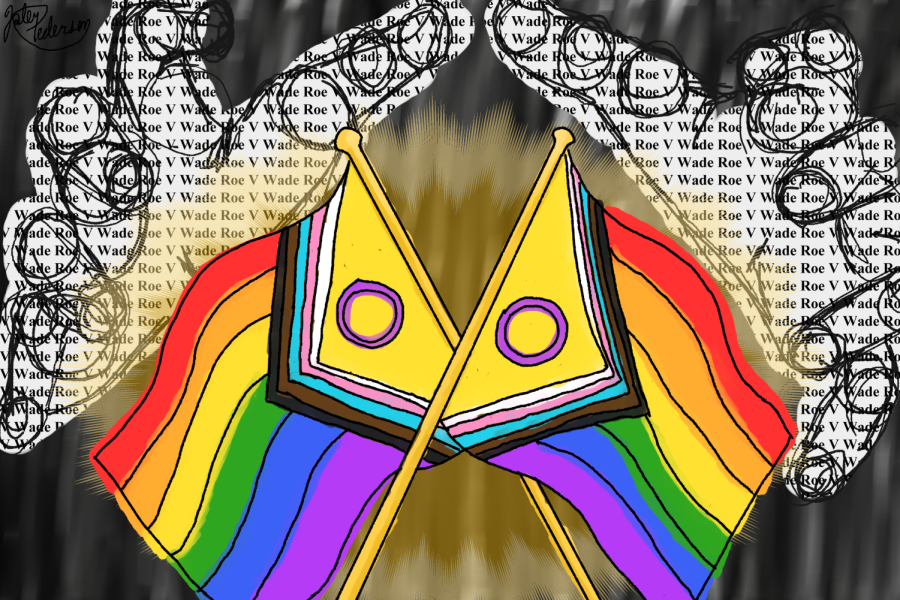The End of Roe v. Wade; Is Gay Marriage Next?
How the recent Dobbs decision could threaten marriage rights
This summer’s SCOTUS decision overturning Roe v Wade may place other rulings such the right to same sex marriage in jeopardy.
In June 2022, the Supreme Court (SCOTUS) overturned Roe v. Wade through the Dobbs v. Jackson Women’s Health Organization ruling, giving control of abortion rights to state governments. The logic behind this ruling relies on a denial of Substantive Due Process protection for abortion. This same ideology could conceivably be used in the future to undermine other unenumerated rights such as contraception, interracial marriage, voting rights, and gay marriage—leaving any number of federal protections essentially up in the air. In the aftermath of Dobbs, one nagging question looms: what else are we certain of that could be gone in an instant?
In just four years, President Trump appointed three Justices to the highest bench in the nation—a rare occurrence and an astonishing opportunity to leave a lasting conservative legacy. Justices Gorsuch, Kavanaugh, and Barret took the bench under the Trump presidency, shifting the court to six conservative members. SCOTUS watchers worry that the same logic used in the Dobbs decision could be used to undermine the same-sex marriage rights established in the Obergefell decision in 2015.
In Obergefell v. Hodges (2015), SCOTUS ruled that same-sex marriage is constitutional under both the Due Process and Equal Protection Clauses of the Fourteenth Amendment. The 5-4 ruling established marriage equality in all US territories. After only seven years, the court’s political makeup could quite plausibly lead to the re-evaluation of the decision.
Justice Clarence Thomas has hinted at such an event. In his original dissent to Obergefell in 2015, Justice Thomas argued the originalist defense that the “decision […] is at odds not only with the Constitution but with the principles upon which our Nation was built.” The key to his argument in both Obergefell and the recent events of Roe v. Wade hinges on a two-word phrase: “substantive rights.”
The Constitution guarantees due process to all citizens before the deprivation of life, liberty, or property may ensue. Due Process protections involve procedural matters (the right to trial by jury, the right to counsel, etc.) and the individual liberties in the Bill of Rights, but also include the much less straightforward “Substantive” Due Process. Substantive Due Process allows the court to protect citizens from government overreach even if the protected right is not specifically enumerated in the Constitution. In Dobbs, SCOTUS overturned the idea that abortion access can be protected by the federal government. The Dobbs decision essentially removed that right from Substantive Due Process, arguing that a woman’s right to choose is neither fundamental nor historically rooted.
What might this have to do with gay marriage? Well, as Thomas articulates, precedents such as Roe and similar Due Process Clause cases—Obergefell—are subject to re-consideration upon the premise that the constitution does not enumerate such substantive rights. The three Justices dissenting in the Dobbs case against such a position worry that this argument could put to question “all rights that have no history stretching back to the mid-19th century.”
The stacked court has shown little fear of taking on controversial issues, including gun regulations, abortion, immigration, climate change, school prayer, and capital punishment. Some observers of the court suggest that the logic of the Dobbs decision could be applied to other unenumerated rights such as same-sex marriage. What exactly would it look like if Obergefell were overturned?
In such a case, individual states would be left with the ability to outlaw same-sex marriage, as numerous states have done with access to abortion, and LGBTQ+ Americans would face life-altering consequences. A change like this would be devastating for millions of couples, families, and individuals across the country as their identities and legal rights are further diminished. It is predicted that same-sex marriage would become illegal in 25 states. Seven additional states are also likely to constrict marriage equality—according to an analysis by the nonpartisan National Conference of State Legislatures—meaning states in support of gay marriage would be the minority.
If Obergefell is really next, who can say? We do know that, according to experts, the reversal of Roe left a slew of other civil rights protections vulnerable—including the right to interracial marriages (Loving v. Virginia), contraception (Griswold v. Connecticut), sexual relationships for LGBTQ+ people (Lawrence v. Texas) and LGBTQ+ marriage. Whatever the future holds, the last few months have solidified one fact without doubt: a politicized court in a nation this polarized has monumental consequences.

As Co-EIC this year, Halie is thrilled to be leading The Advocate. Since beginning their career in student journalism in sophomore year, they have developed...










